Charles E W Bean, Diaries, AWM38 3DRL 606/276/1 - 1928-1937 - Part 7
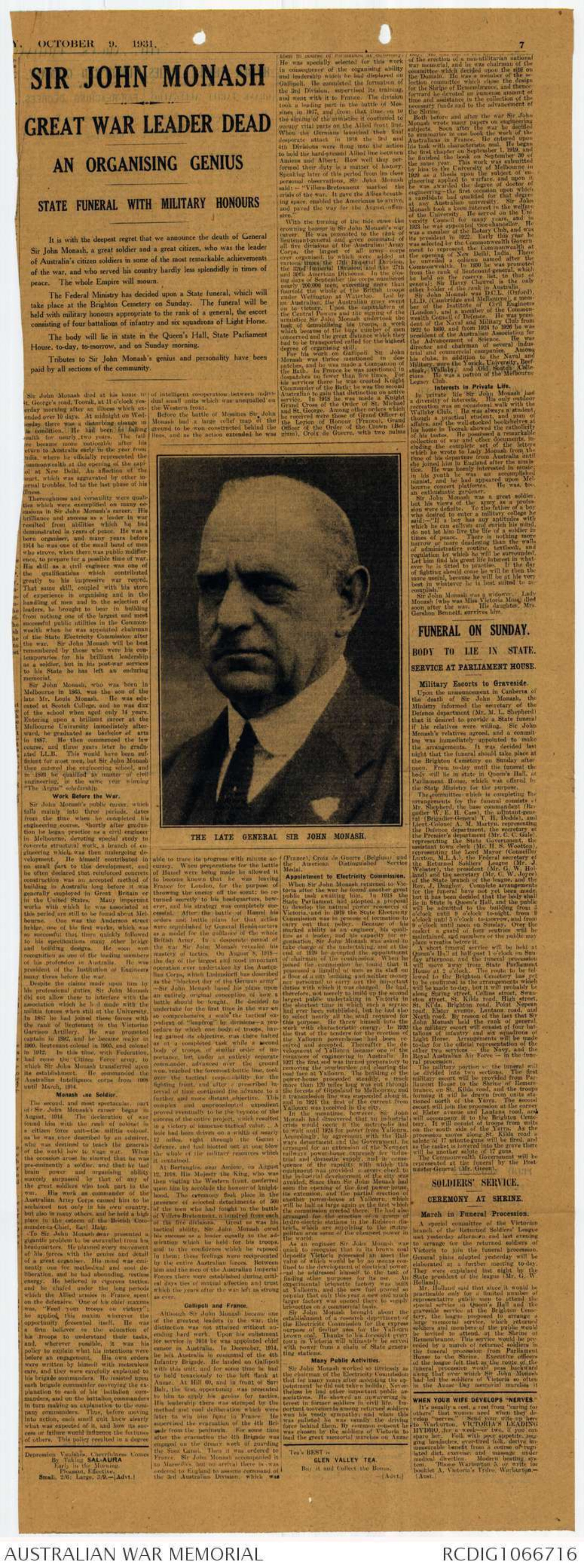
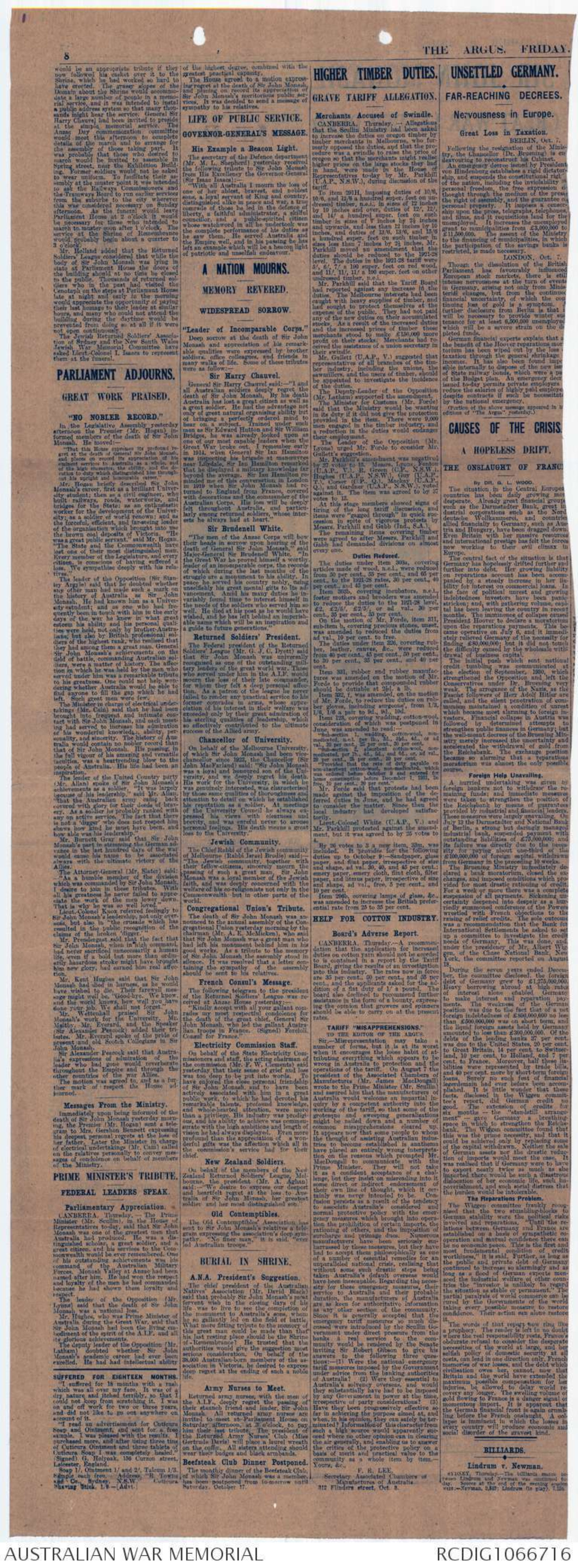
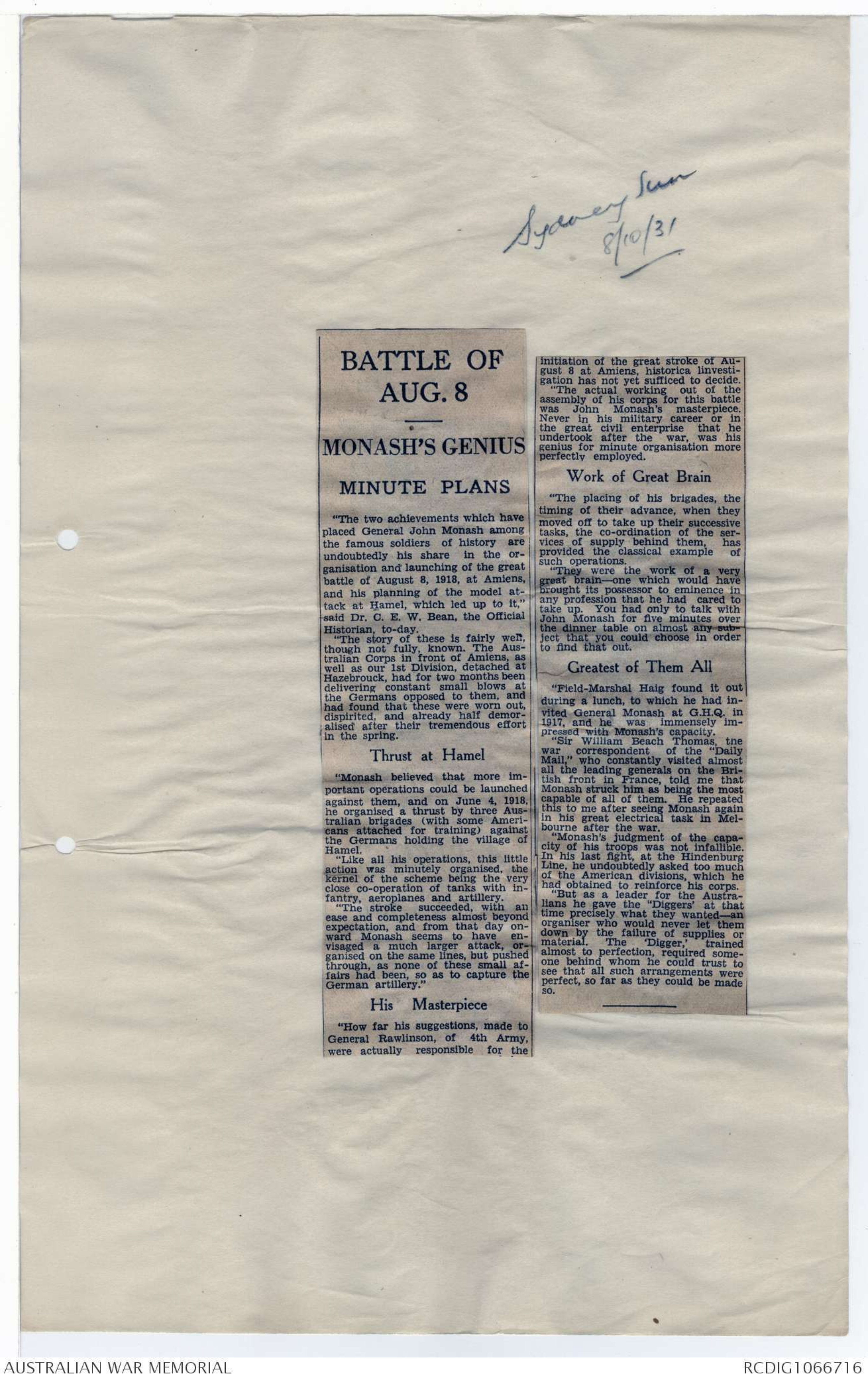
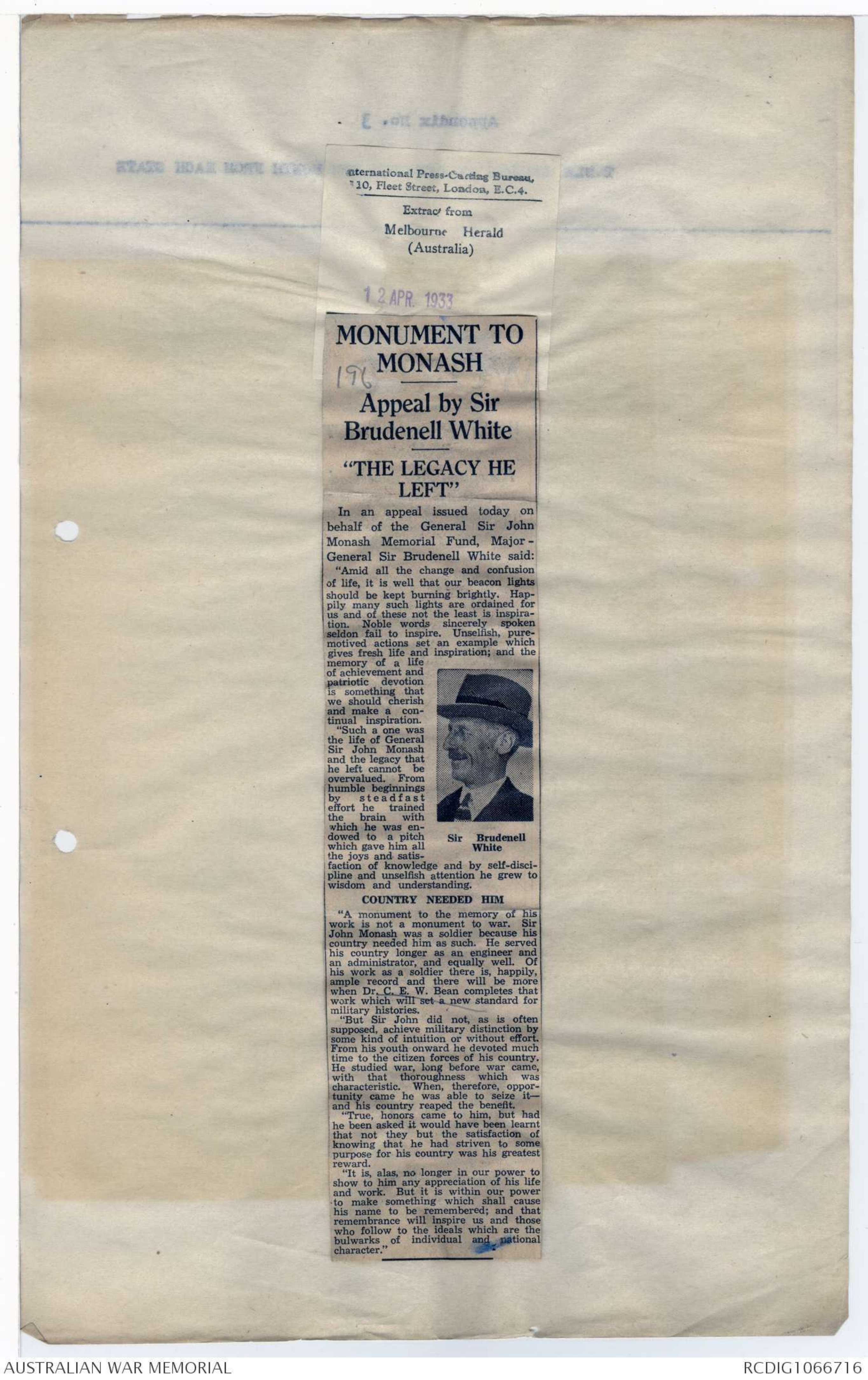
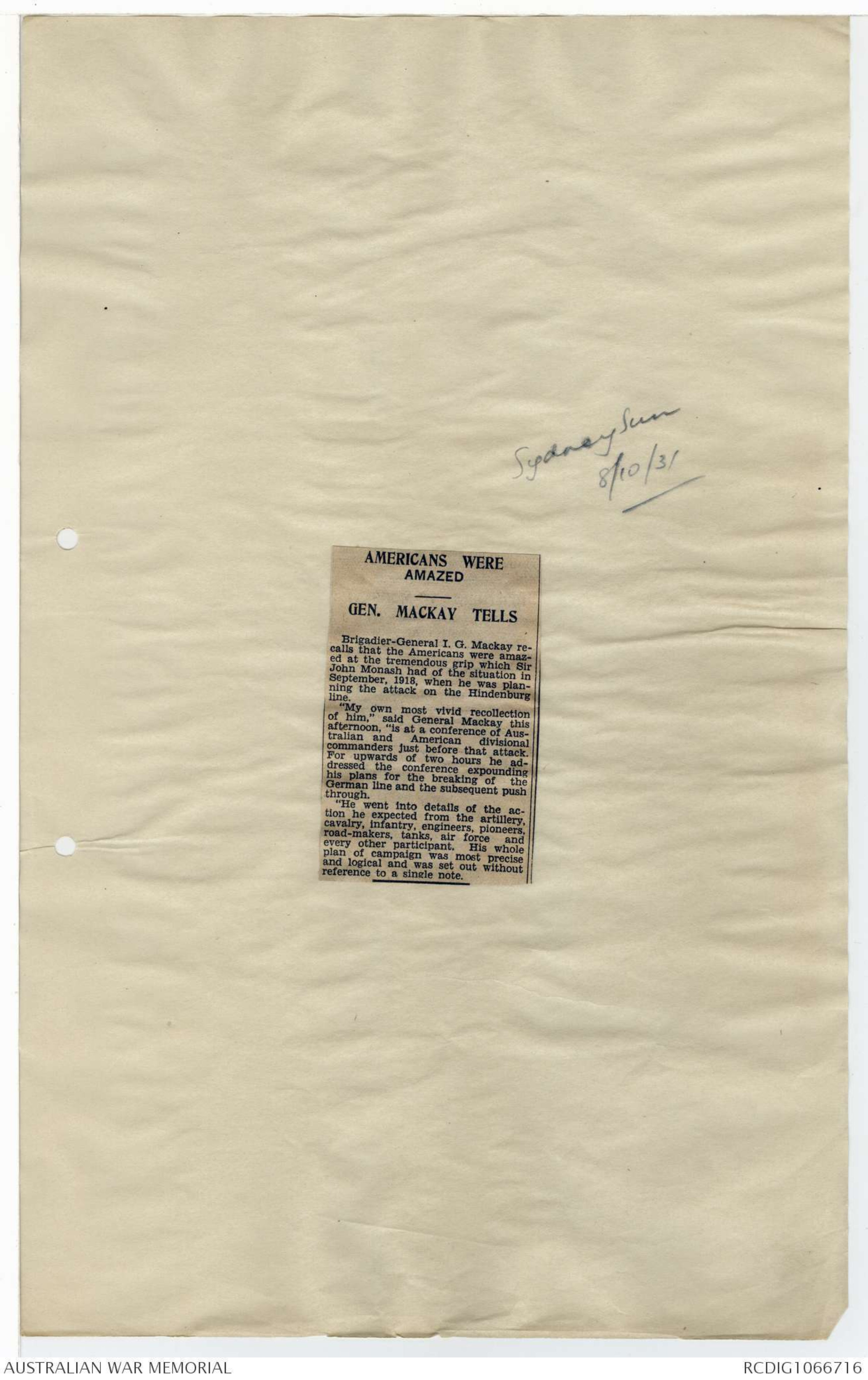
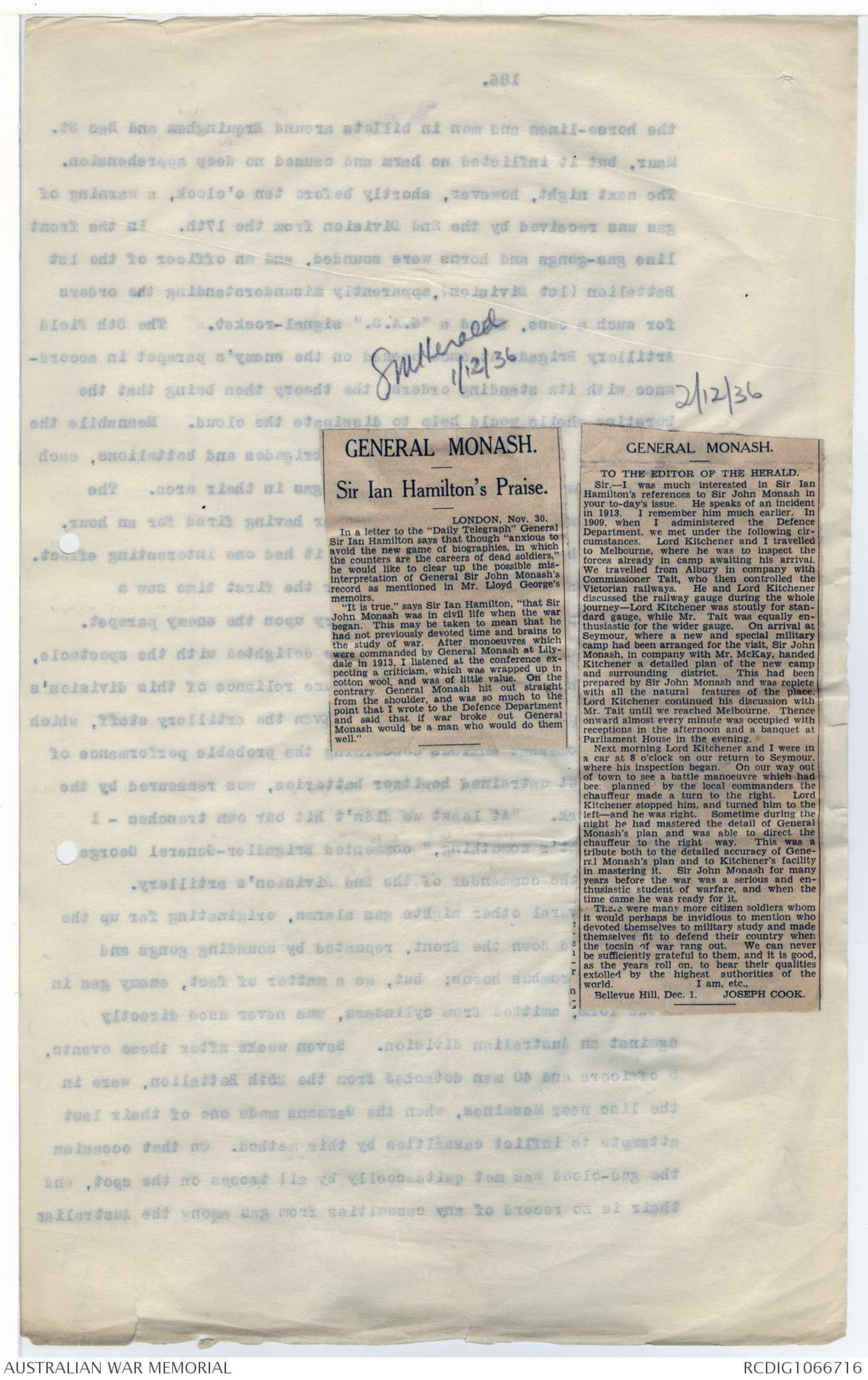
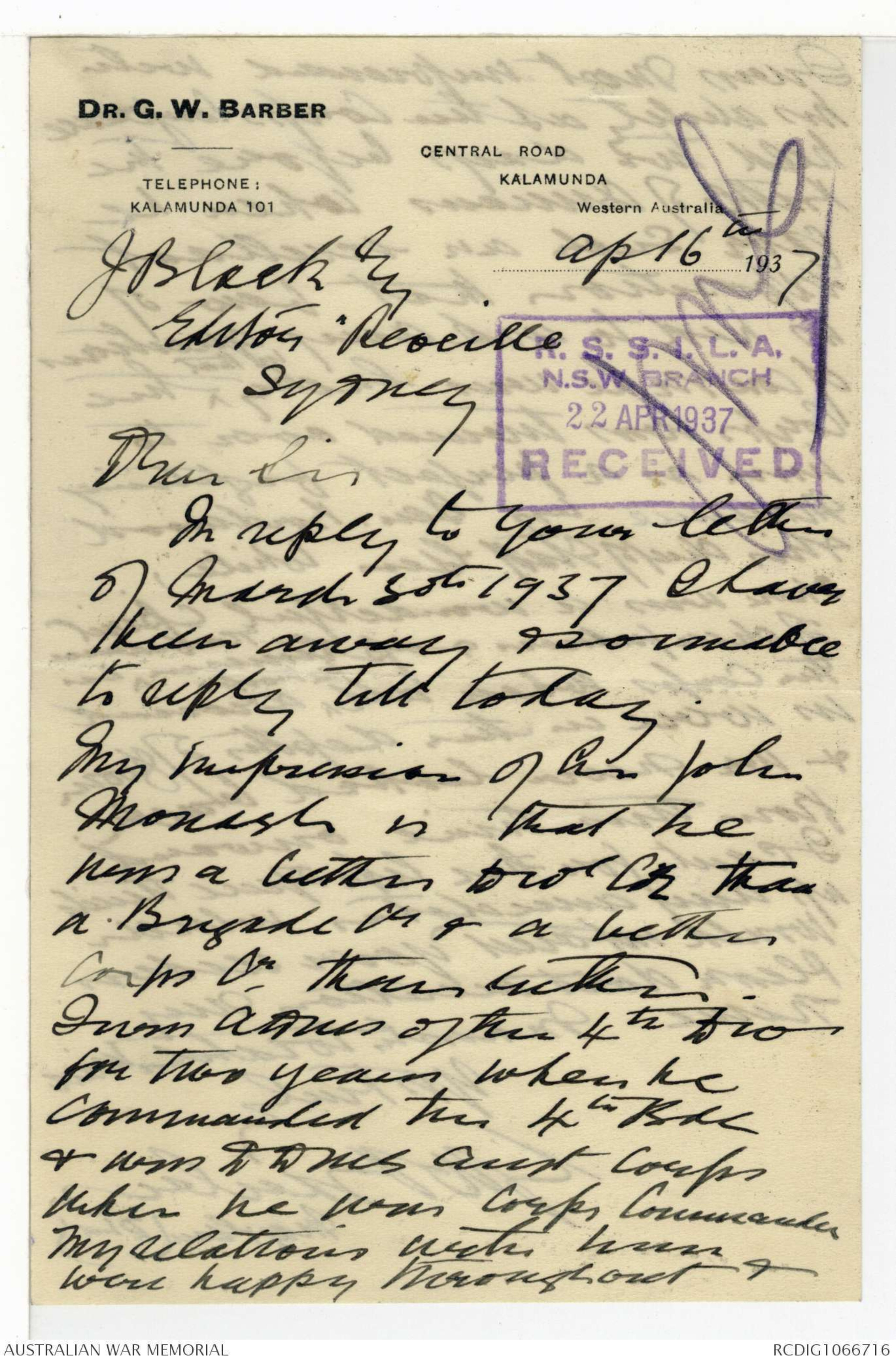
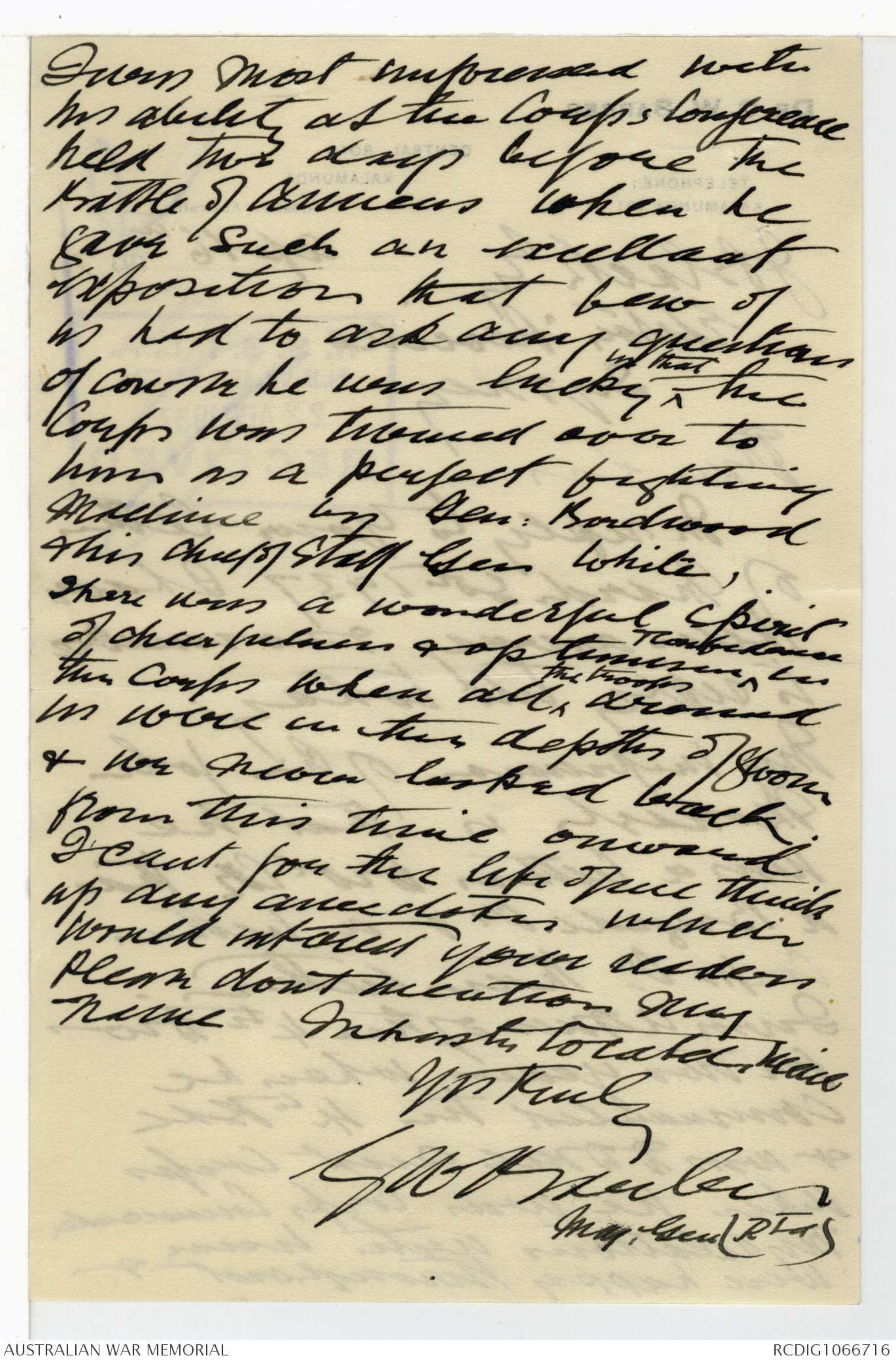
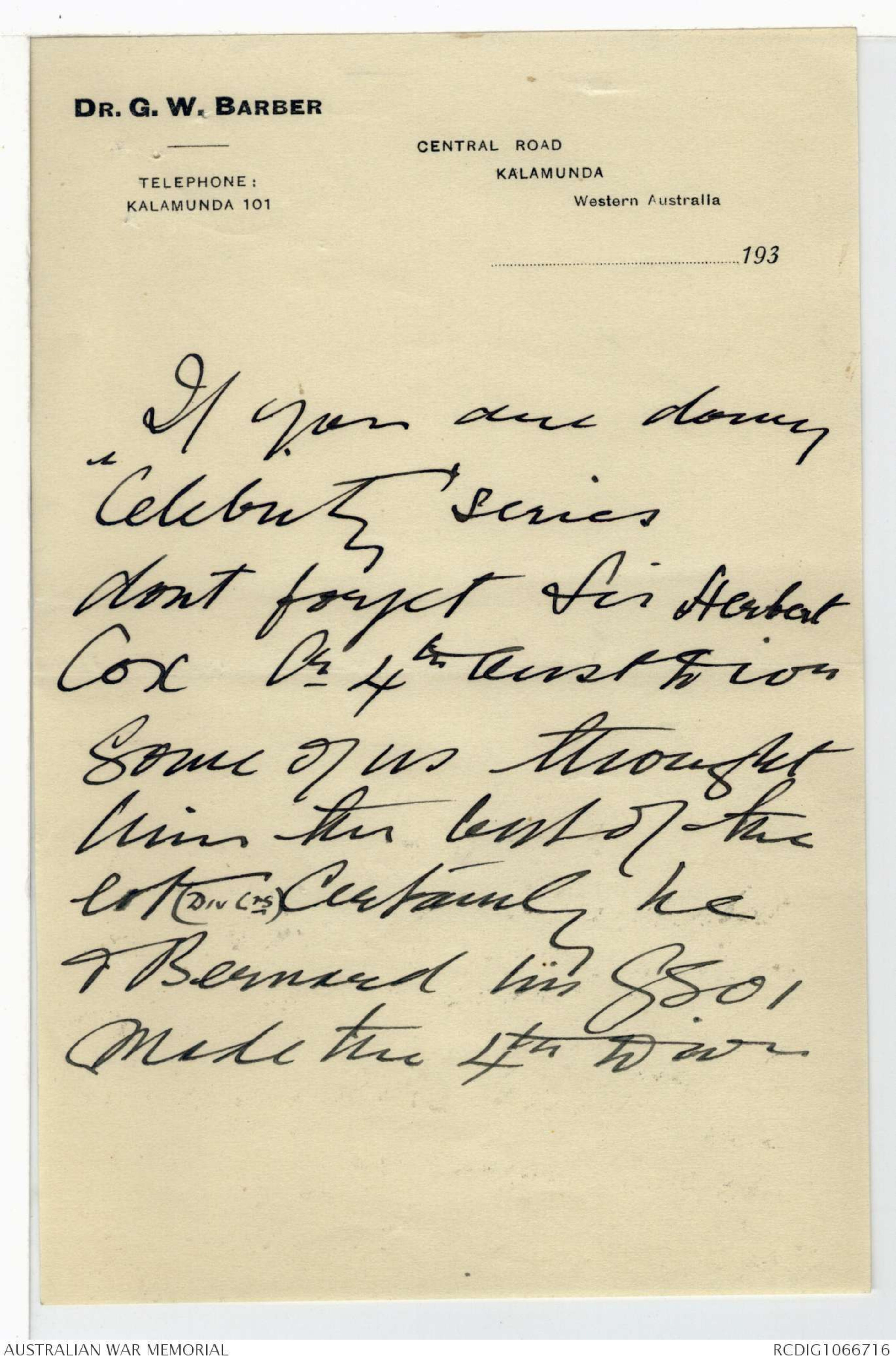
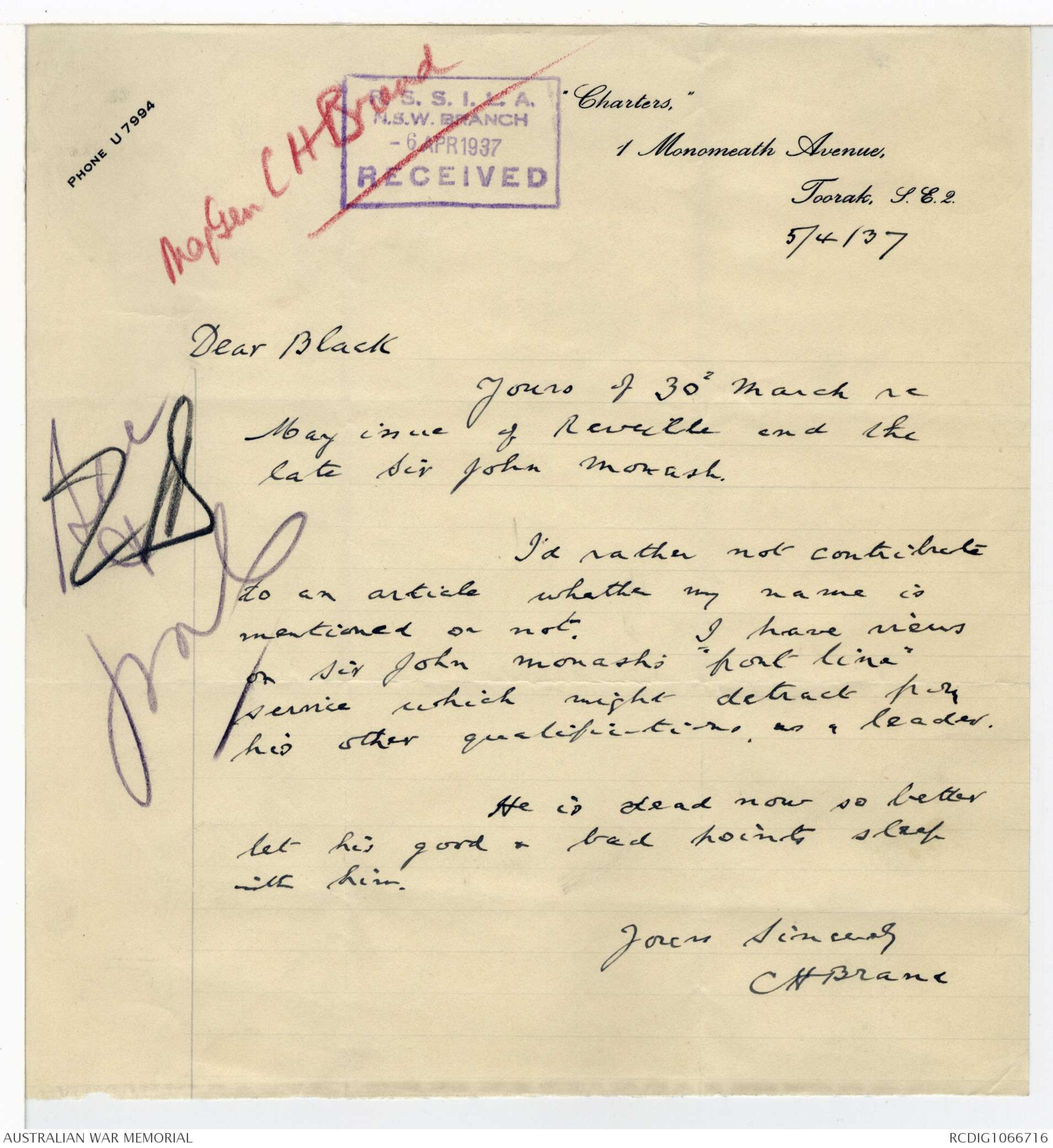
Newspaper article- see original document
OCTOBER 9. 1931.
SIR JOHN MONASH
GREAT WAR LEADER DEAD
AN ORGANISING GENIUS
STATE FUNERAL WITH MILITARY HONOURS
It is with the deepest regret that we announce the death of General
Sir John Monash, a great soldier and a great citizen, who was the leader
of Australia's citizen soldiers in some of the most remarkable achievements
of the war, and who served his country hardly less splendidly in times of
Peace. The whole Empire will mourn.
The Federal Ministry has decided upon a State funeral, which will
take place at the Brighton Cemetery on Sunday. The funeral will be
held with military honours appropriate to the rank of a general, the escort
consisting of four battalions of infantry and six squadrons of Light Horse.
The body will lie in state in the Queen's Hall, State Parliament
House, to-day, to-morrow, and on Sunday morning.
Tributes to Sir John Monash's genius and personality have been
paid by all sections of the community.
Newspaper article - see original document
Tributes to Sir John Monash
Sydney Sun
8/10/31
BATTLE OF
AUG. 8
MONASH'S GENIUS
MINUTE PLANS
"The two achievements which have
placed General John Monash among
the famous soldiers of history are
undoubtedly his share in the organisation
and launching of the great
battle of August 8, 1918, at Amiens,
and his planning of the model attack
at Hamel, which led up to it,"
said Dr. C. E. W. Bean, the Official
Historian, to-day.
"The story of these is fairly well,
though not fully, known. The Australian
Corps in front of Amiens, as
well as our 1st Division, detached at
Hazebrouck, had for two months been
delivering constant small blows at
the Germans opposed to them, and
had found that these were worn out,
dispirited, and already half demoralised
after their tremendous effort
in the spring.
Thrust at Hamel
"Monash believed that more important
operations could be launched
against them, and on June 4, 1918,
he organised a thrust by three Australian
brigades (with some Americans
attached for training) against
the Germans holding the village of
Hamel.
"Like all his operations, this little
action was minutely organised, the
kernel of the scheme being the very
close co-operation of tanks with infantry,
aeroplanes and artillery.
"The stroke succeeded, with an
ease and completeness almost beyond
expectation, and from that day onward
Monash seems to have envisaged
a much larger attack, organised
on the same lines, but pushed
through, as none of these small affairs
had been, so as to capture the
German artillery."
His Masterpiece
"How far his suggestions, made to
General Rawlinson, of 4th Army,
were actually responsible for the
initiation of the great stroke of August
8 at Amiens, historical investigation
has not yet sufficed to decide.
"The actual working out of the
assembly of his corps for this battle
was John Monash's masterpiece.
Never in his military career or in
the great civil enterprise that he
undertook after the war, was his
genius for minute organisation more
perfectly employed.
Work of Great Brain
"The placing of his brigades, the
timing of their advance, when they
moved off to take up their successive
tasks, the co-ordination of the services
of supply behind them, has
provided the classical example of
such operations.
"They were the work of a very
great brain—one which would have
brought its possessor to eminence in
any profession that he had cared to
take up. You had only to talk with
John Monash for five minutes over
the dinner table on almost any subject
that you could choose in order
to find that out.
Greatest of Them All
"Field-Marshal Haig found it out
during a lunch, to which he had invited
General Monash at G.H.Q. in
1917, and he was immensely impressed
with Monash's capacity.
"Sir William Beach Thomas, the
war correspondent of the "Daily
Mail", who constantly visited almost
all the leading generals on the British
front in France, told me that
Monash struck him as being the most
capable of all of them. He repeated
this to me after seeing Monash again
in his great electrical task in Melbourne
after the war.
"Monash's judgment of the capacity
of his troops was not infallible.
In his last fight, at the Hindenburg
Line, he undoubtedly asked too much
of the American divisions, which he
had obtained to reinforce his corps.
"But as a leader for the Australians
he gave the "Diggers' at that
time precisely what they wanted—an
organiser who would never let them
down by the failure of supplies or
material. The "Digger,' trained
almost to perfection, required someone
behind whom he could trust to
see that all such arrangements were
perfect, so far as they could be made
so.
International Press-Cutting Bureau,
10 Fleet Street, London, E.C.4.
Extract from
Melbourne Herald
(Australia)
12 APR. 1933
MONUMENT TO MONASH
196
Appeal by Sir
Brudenell White
"THE LEGACY HE
LEFT"
In an appeal issued today on
behalf of the General Sir John
Monash Memorial Fund, Major -
General Sir Brudenell White said:
"Amid all the change and confusion
of life, it is well that our beacon lights
should be kept burning brightly. Happily
many such lights are ordained for
us and of these not the least is inspiration.
Noble words sincerely spoken
seldom fail to inspire. Unselfish, pure-
motived actions set an example which
gives fresh life and inspiration; and the
memory of a life
of achievement and
patriotic devotion
is something that
we should cherish
and make a continual
inspiration.
White "Such a one was
the life of General
Sir John Monash
and the legacy that
he left cannot be
overvalued. From
humble beginnings
by steadfast
effort he trained
the brain with
which he was endowed
to a pitch
which gave him all
the joys and satisfaction
of knowledge and by self-discipline
and unselfish attention he grew to
wisdom and understanding.
COUNTRY NEEDED HIM
"A monument to the memory of his
work is not a monument to war. Sir
John Monash was a soldier because his
country needed him as such. He served
his country longer as an engineer and
an administrator, and equally well. Of
his work as a soldier there is, happily,
ample record and there will be more
when Dr. C. E. W. Bean completes that
work which will set a new standard for
military histories.
"But Sir John did not, as is often
supposed, achieve military distinction by
some kind of intuition or without effort.
From his youth onward he devoted much
time to the citizen forces of his country.
He studied war, long before war came,
with that thoroughness which was
characteristic. When, therefore, opportunity
came he was able to seize it—
and his country reaped the benefit.
"True, honors came to him, but had
he been asked it would have been learnt
that not they but the satisfaction of
knowing that he had striven to some
purpose for his country was his greatest
reward.
"It is, alas, no longer in our power to
show to him any appreciation of his life
and work. But it is within our power
to make something which shall cause
his name to be remembered; and that
remembrance will inspire us and those
who follow to the ideals which are the
bulwarks of individual and national
character."
Sydney Sun
8/10/31
Newspaper article - see original document
AMERICANS WERE AMAZED
GEN. MACKAY TELLS
Brigadier-General I. G. Mackay recalls
that the Americans were amazed
at the tremendous grip which Sir
John Monash had of the situation in
September, 1918, when he was planning
the attack on the Hindenburg line.
"My own most vivid recollection
of him," said General Mackay this
afternoon, "is at a conference of Australian
and American divisional
commanders just before that attack.
For upwards of two hours he addressed
the conference expounding
his plans for the breaking of the
German line and the subsequent push
through.
"He went into details of the action
he expected from the artillery,
cavalry, infantry, engineers, pioneers,
road-makers, tanks, air force and
every other participant. His whole
plan of campaign was most precise
and logical and was set out without
reference to a single note.
Newspaper articles - see original document
SM Herald 1/12/36 2/12/36
GENERAL MONASH.
Sir lan Hamilton's Praise.
LONDON. Nov. 30. In a letter to the "Daily Telegraph" General
Sir Ian Hamilton says that though "anxious to
avoid the new game of biographies, in which
the counters are the careers of dead soldiers,"
he would like to clear up the possible misinterpretation
of General Sir John Monash's
record as mentioned in Mr. Lloyd George's
memoirs. "It is true." says Sir Ian Hamilton, "that Sir
John Monash was in civil life when the war
began. This may be taken to mean that he
had not previously devoted time and brains to
the study of war. After monoeuvres which
were commanded by General Monash at Lilydale
in 1913, I listened at the conference expecting
a criticism, which was wrapped up in
cotton wool, and was of little value. On the
contrary. General Monash hit out straight
from the shoulder, and was so much to the
point that I wrote to the Defence Department
and said that if war broke out General
Monash would be a man who would do them
well."
GENERAL MONASH.
TO THE EDITOR OF THE HERALD.
Sir,—I was much interested in Sir Ian
Hamilton's references to Sir John Monash in
your to-day's issue. He speaks of an incident
in 1913. I remember him much earlier, In
1909, when I administered the Defence
Department, we met under the following circumstances.
Lord Kitchener and I travelled
to Melbourne, where he was to inspect the
forces already in camp awaiting his arrival.
We travelled from Albury in company with
Commissioner Tait, who then controlled the
Victorian railways. He and Lord Kitchener
discussed the railway gauge during the whole
journey––Lord Kitchener was stoutly for standard
gauge, while Mr. Tait was equally enthusiastic
for the wider gauge. On arrival at
Seymour, where a new and special military
camp had been arranged for the visit, Sir John
Monash, in company with Mr. McKay, handed
Kitchener a detailed plan of the new camp
and surrounding district. This had been
prepared by Sir John Monash and was replete
with all the natural features of the place.
Lord Kitchener continued his discussion with
Mr. Tait until we reached Melbourne. Thence
onward almost every minute was occupied with
receptions in the afternoon and a banquet at
Parliament House in the evening.
Next morning Lord Kitchener and I were in
a car at 8 o'clock on our return to Seymour,
where his inspection began. On our way out
of town to see a battle manoeuvre which had
bee planned by the local commanders the
chauffeur made a turn to the right. Lord
Kitchener stopped him, and turned him to the
left –– and he was right. Sometime during the
night he had mastered the detail of General
Monash's plan and was able to direct the
chauffeur to the right way. This was a
tribute both to the detailed accuracy of General
Monash's plan and to Kitchener's facility
in mastering it. Sir John Monash for many
years before the war was a serious and enthusiastic
student of warfare, and when the
time came he was ready for it.
There were many more citizen soldiers whom
it would perhaps be invidious to mention who
devoted themselves to military study and made
themselves fit to defend their country when
the tocsin of war rang out. We can never
be sufficiently grateful to them, and it is good,
as the years roll on, to hear their qualities
extolled by the highest authorities of the
world. I am, etc.,
Bellevue Hill, Dec. 1. JOSEPH COOK.
Dr. G.W. BARBER
Telephone,
Kalamunda 101
Central Road
Kalamunda
Western Australia
Ap 16th 1937
J Black Esq Editor "Reveille Sydney
R. S. S. I. L. A.
N.S.W. BRANCH
22 APR 1937
RECEIVED
Dear Sir
In reply to your letter
of March 30th 1937 I have
been away & so unable
to reply till today.
My impression of Sir John
Monash is that he
was a better Divl Cr than
a Brigade Cr & a better
Corps Cr than either.
I was ADMS of his 4th Div
for two years when he
commanded the 4th Bde
& was DDMS Aust Corps
when he was Corps Commander
My relations with him
were happy throughout &
I was most impressed with
his ability at the Corps Conference
held two days before the
Battle of Amiens when he
gave such an excellent
exposition that few of
us had to ask any questions
of course he was lucky ^in that his
Corps was turned over to
him as a perfect fighting
machine by Gen. Birdwood
& his Chief of Staff Gen White,
There was a wonderful spirit
of cheerfulness & optimism ^& confidence in
the Corps when all the troops around
us were in their depths of gloom
& we never looked back
from this time onward
I cant for the life of me think
of any anecdotes which
would interest your readers
Please dont mention my
name – In haste to catch mail.
Yrs Truly
GW Barber
Maj, Gen (Rtd)
Dr. G.W. BARBER
Telephone,
Kalamunda 101
Central Road
Kalamunda
Western Australia
193
If you are doing
“Celebrity “ series
dont forget Sir Herbert
Cox Cr 4th Aust Divn
Some of us thought
him the best of the
lot (Div Crs) Certainly he
& Bernard his GS01
Made the 4th Divn
Phone U 7994
Maj Gen C H Brand
R.S.S.I.L.A.
N.S.W. BRANCH
-6 APR1937
RECEIVED
"Charters,"
1 Monomeath Avenue,
Toorak, S.E.2
5/4/37 Dear Black
[*xx*]
[*JMC*]
Yours of 30th March re
May issue of Reveille and the
late Sir John Monash.
I'd rather not contribute
to an article whether my name is
mentioned or not. I have views
on Sir John Monash's "front line"
service which might detract from
his other qualifications as a leader.
He is dead now so better
let his good & bad points sleep
with him.
Yours sincerely
CH Brand
 Maralyn K
Maralyn KThis transcription item is now locked to you for editing. To release the lock either Save your changes or Cancel.
This lock will be automatically released after 60 minutes of inactivity.